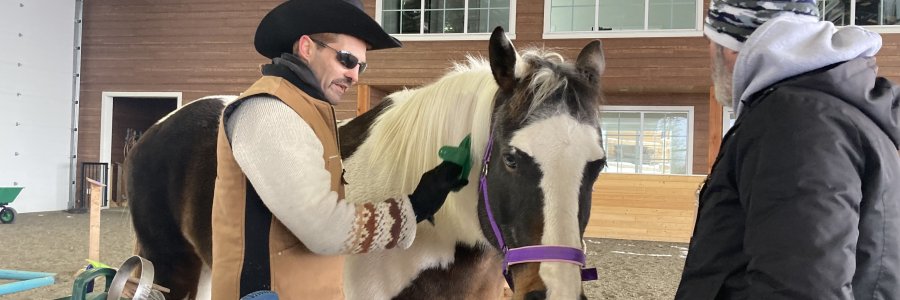Bridgeway Participants Work With Horses on Their Recovery Journey
Feb 28, 2023

At nine years old, Deb Porter knew instantly that horses could help people. Her passion for horses stayed with her as she grew up and began Outreach work with youth, adults and families. Through her work in the community, it became apparent to Deb that maintaining healthy relationships contributes to an individual’s wellbeing. She also knew that horses are great teachers when it comes to learning interpersonal skills such
as communication, empathy and appropriate assertiveness. With her background in social services and her passion for horses, she opened Horseworks, an Equine Assisted Learning Centre.
The Bridge Youth & Family Services and Horseworks have been collaborating to offer programming to participants. This winter, Horseworks welcomed two groups of 10-12 from our Bridgeway Intensive Live-In Treatment Centre. Horseworks offers up to 10 group sessions, with each focused on a different objective that builds life skills through experiential learning. Topics explored in the sessions include self-awareness, responsibility, vulnerability, trust, leadership and more, all without mounting or riding the horse.
|
|
Equine Assisted Learning can help with:
|
During a session at Horseworks, participants are paired with a partner and one horse to share. They learn how to respond to the horse’s unique personality and mood, how to lead the horse through obstacles, and how to communicate with their partner to complete challenges. Compromise is needed as participants navigate their needs along with the needs of their partner and the horse.
“We can learn a lot from horses,” says Deb, “They are great non-verbal communicators, and give direct feedback as to how they are feeling. It can inspire participants to reflect on how they are perceived, and consider perspectives and feelings outside of their own.”
Because horses are prey animals, their main concern is safety. Horses are very present and receptive to body language and external stimulus. Self-awareness, empathy and consideration become paramount as participants reflect on their own approach and assumptions while interacting with the horse. Participants are able to change their approach in real-time to see how well they are communicating, which is different than other therapy-based approaches. The best part is, unlike complex interpersonal situations we may encounter in everyday life, horses are entirely forgiving, patient, and willing to give participants a chance to get it right.
“After a session at Horseworks, I felt like my energy shifted. The staff offered me a safe space to explore my feelings, and being around the horses made me feel calmer. It was the first time in a while that my negative feelings shifted to a feeling of positivity, empowerment and hope.”
-A participant from Bridgeway
During the final session, Horseworks offers an exercise named ‘Catch That Horse’, where participants learn appropriate assertiveness and self-awareness through a hands-on approach. The goal of the exercise is to catch a horse that is playing and running around the arena, and lead them back to be tethered to the wall.
This exercise is difficult because participants must be aware of their body language and intent. Not only do they have to successfully catch the horse, but they must think about how they need to adjust their presence and assertiveness to ensure the horse feels comfortable. Participants have a halter in hand, so they must consider how the horse perceives the halter and how to present it to the horse in a non-threatening way. If they walk towards the horse with too purposeful of a stride, the horse may feel pressured and turn away. However, if participants aren’t assertive enough, the horse may sense fear and not cooperate. This exercise clearly teaches participants how important it is to understand how they are perceived by others and how their presence could make someone else feel, which is the foundation of emotional intelligence. It teaches participants how to respect differences and get along with others who may have a different approach.
One participant named Mary* began the exercise and was new to effective communication and team work. She did not have a lot of communication tools to draw upon. As a result she had a tough time with the activity and because of this, her horse stopped in its tracks and refused to cooperate. Through a conversation with a facilitator, Mary was able to understand that the horse responded out of fear because of her actions. Once she understood that she frightened the horse, she became aware of the horse’s needs and approached the horse with sensitivity. Mary began to understand how her actions affected others in her life and how approaching those situations with sensitivity may have resulted in a different response.
“Everything we learn in the arena at Horseworks, we can also apply to our everyday lives,” says Deb Porter. Because of Horseworks, our participants were able to build interpersonal skills to help them thrive, which may have previously posed barriers to their recovery journey. In the words of Johann Hari, “the opposite of addiction isn’t sobriety - it is connection.” Through our participants experiencing connection with Equine Assisted Learning, they are building trust, empathy, vulnerability and communication skills that can help them to repair broken relationships. With the help of Horseworks, participants can begin to heal their relationships to themselves, their loved ones and their substance use.
*Participant names and details have been changed for participant confidentiality
This program is made possible through a grant from The Horsemanship For Life Project.



